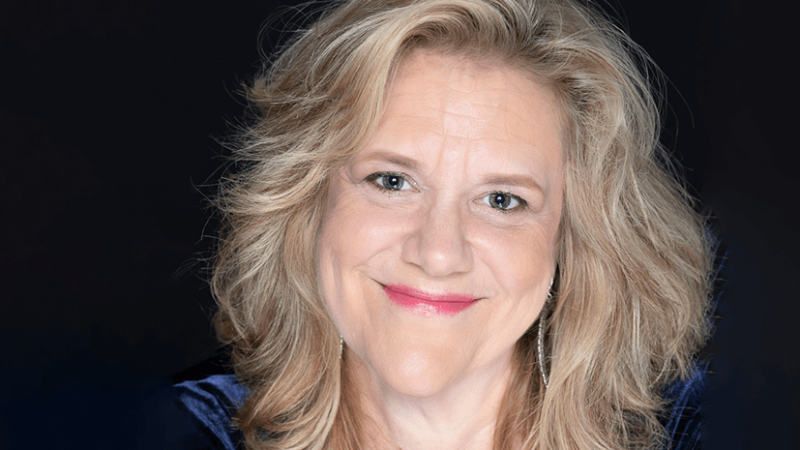-
E117: The Real Work: Letting Go from Within
Michael Singer — October 2, 2025
True spirituality isn’t about mystical experiences or lofty ideals—it’s about honestly facing...
-
Once More: Reflections on Reincarnation and the Gap Between Lives
Tami Simon — September 26, 2025
In this special reflection episode of Insights at the Edge host Tami Simon looks back on her...
-
Honey Tasting Meditation: Build Your Relationship with Sweetness
There is a saying that goes “hurt people hurt people.” I believe this to be true. We have been...
Written by:
Amy Burtaine, Michelle Cassandra Johnson
-
Many Voices, One Journey
The Sounds True Blog
Insights, reflections, and practices from Sounds True teachers, authors, staff, and more. Have a look—to find some inspiration and wisdom for uplifting your day.
Standing Together, and Stepping Up
Written By:
Tami Simon -
The Michael Singer Podcast
Your Highest Intention: Self-Realization
Michael Singer discusses intention—"perhaps the deepest thing we can talk about"—and the path to self-realization.
This Week:
E116: Doing the Best You Can: The Path to Liberation -
Many Voices, One Journey
The Sounds True Blog
Insights, reflections, and practices from Sounds True teachers, authors, staff, and more. Have a look—to find some inspiration and wisdom for uplifting your day.
Take Your Inner Child on Playdates
Written By:
Megan Sherer
600 Podcasts and Counting...
Subscribe to Insights at the Edge to hear all of Tami's interviews (transcripts available, too!), featuring Eckhart Tolle, Caroline Myss, Tara Brach, Jack Kornfield, Adyashanti, and many more.
Most Recent
Being Open to Open Monogamy
Tammy Nelson, PhD, is a licensed psychotherapist, Board Certified Sexologist, Certified Sex Therapist, and a Certified Imago Relationship Therapist. She is a TEDx speaker and the host of The Trouble with Sex podcast. Her six books include Getting the Sex You Want, The New Monogamy, and her latest work, Open Monogamy.
In this podcast, Dr. Nelson joins host Tami Simon for an informative and inspiring conversation about the emerging new definition of monogamy as people look beyond traditional marriage to find long-term happiness and fulfillment. Tami and Dr. Nelson also discuss the monogamy continuum—and how to talk about it with your partner; Dr. Nelson’s view that all consensual agreements between consenting adults should be normalized; “second adolescence” and opening relationships for the wrong reasons; engaging in “what if” conversations; why there’s never a coincidence in the partners that you choose; the pandemic’s impact on our sex lives and intimate relationships; monogamy and non-monogamy throughout the developmental phases of relationships; fear, trust, safety, and risk-taking; eroticism and self-awareness; the new terminology of open monogamy; and much more.
What You Can Do to Make Your Relationship Work
Elizabeth Earnshaw works with individuals, couples, and families and is the founder of A Better Life Therapy. She holds a master’s degree in marriage and family therapy, is a licensed marriage and family therapist, and is a certified Gottman Method couples therapist. Elizabeth also trains and supervises new therapists seeking their licenses in the counseling field. With Sounds True, she is the author of I Want This to Work: An Inclusive Guide to Navigating the Most Difficult Relationship Issues We Face in the Modern Age.
In this podcast, Sounds True founder, Tami Simon, speaks with Elizabeth Earnshaw about what she has discovered to be the building blocks for a successful relationship—and the most common pitfalls that can lead to irreparable damage. They also discuss the unique approach of the Gottman Method and the research behind it; the importance of turning toward your partner (and the dangers of turning away); “bids for connection” as key moments in relationship; the “four horsemen” of unhealthy communication: criticism, defensiveness, stonewalling, and contempt; the three Rs of a healthy relationship: reliability, respect, and responsiveness; interdependence, or how we balance our desires for connection and our desires for autonomy; repairing broken trust; the recent dramatic decline in the divorce rate; the connection between happy relationships and physical health; avoiding the trap of “triangulation”; and more.
Tracking Wonder
Jeffrey Davis is a researcher, consultant, and the founder of the Tracking Wonder Consultancy. With Sounds True, he’s released the new book Tracking Wonder: Reclaiming a Life of Meaning and Possibility in a World Obsessed with Productivity. In this episode of Insights at the Edge, Tami Simon speaks with Jeffrey about his lifelong work of understanding and spreading wonder. Jeffrey explains the six emotional facets that come together to create wonderment, as well as how to cultivate each in your daily life. Tami and Jeffrey discuss the value of accepting confusion, what we can learn from challenging times, and the positive emotions wonder cultivates. They talk about “wonder interventions” in the workplace and the untapped potential of focused daydreaming for robust creativity. Finally, Jeffrey and Tami discuss the power of personal devotions and the joyous act of gifting someone else with wonderment.
Customer Favorites
Andrew Holecek: Reverse Meditation
Your mindfulness practice worked! You calmed your mind and felt the deep, inner bliss that meditation brings. But, asks Andrew Holecek, what do you do with these beatific states when your world is falling apart? Where’s your meditation practice then?
In this podcast, Tami Simon speaks with Holecek about his new book, Reverse Meditation, and how we can move toward a more complete spirituality that welcomes all of our experience. Illuminating the four steps of reverse meditation and much more, their conversation explores: how pain and hardship can accelerate the spiritual journey; why mindfulness “sedates but doesn’t liberate”; the cultivation of “industrial-strength” meditation; repairing an adverse relationship to unwanted experiences; the practice of open awareness; bringing the unconscious into the light of consciousness; investigating our personal “super-contractors” such as anger, fear, or anxiety; shifting from reactivity to responsiveness; the OBEY acronym of reverse meditation: observe, be, examine, yoke; three attitudes for practice: kindness, patience, and curiosity; establishing the right view; the anti-complaint meditation; and productive thinking.
Note: This episode originally aired on Sounds True One, where these special episodes of Insights at the Edge are available to watch live on video and with exclusive access to Q&As with our guests. Learn more at join.soundstrue.com.
Let the Dark Places Be Teachers
FIND THE SOURCE
This is a tender exercise, a tracing of pain, the path back to the deepest wound. For myself, a huge hurt that I carry is often the source of great realizations and growth. I’ve worked with many different types of therapy for years to figure out where my pain stems from, and my curiosity has been my greatest guide in this effort. I want to know why I am the way I am, and my trauma informs so much of my mindset. Do you know where your pain comes from? Does it point back to a certain occurrence? Do you have only a vague idea, a slight memory, that seems to be the source? What do you do to familiarize yourself with the hurt you carry?
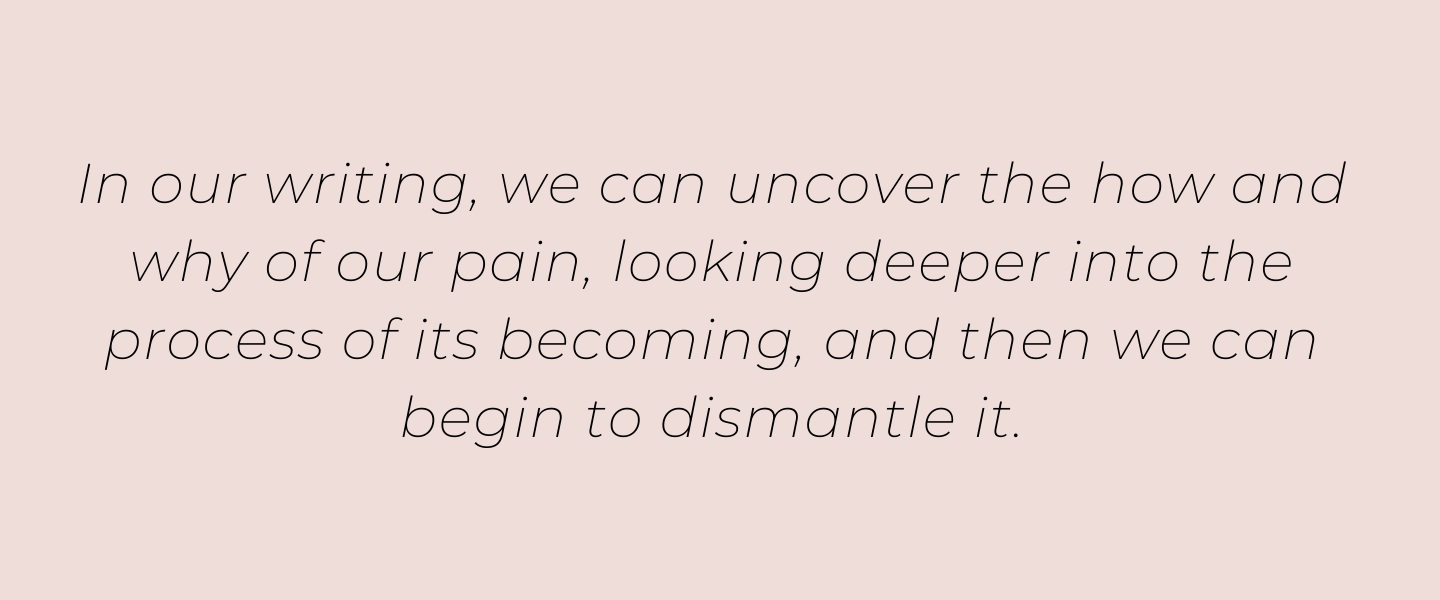
There are countless, well-trusted methodologies to help us become acquainted with our pain, and when we dig into this work, the cave of our understanding becomes incredibly deep.
I like to turn my pain into a guide. I follow its directions, meditating on where it all began. It’s at these starting points where I find the most potent feelings. My heartbreak from a failed relationship will often give me a chance to let out my sadness in verse, but not before I try to unpack the whole story. Only when I attempt to understand the many aspects of this failed relationship can I fully feel it and pay tribute to it. I begin this kind of investigation by rambling in my journal. Then, if I feel inclined, I might pull the heart of my understanding into poetic form. I recently wrote a book of poetry called Help in the Dark Season, which focuses on my childhood trauma, the way it affects my adult relationships, and the modes of healing that have helped me grow. Writing this book was extremely hard, but after I finished, I felt like I’d turned coal into gold. I pulled back the curtain inside myself and let light do its thing. Now I not only get to feel the inner effects of my work but I’m also able to witness the importance of sharing this book with others, the way my words act as a key to unlock their personal process of healing. The result of this revealing has been an honesty and a newness that I couldn’t have reached without the alchemy of writing poetry.
I urge you to do this hard work with your trauma, if you’re able. Give yourself permission to move into the realm of blame. Maybe move beyond it toward forgiveness.
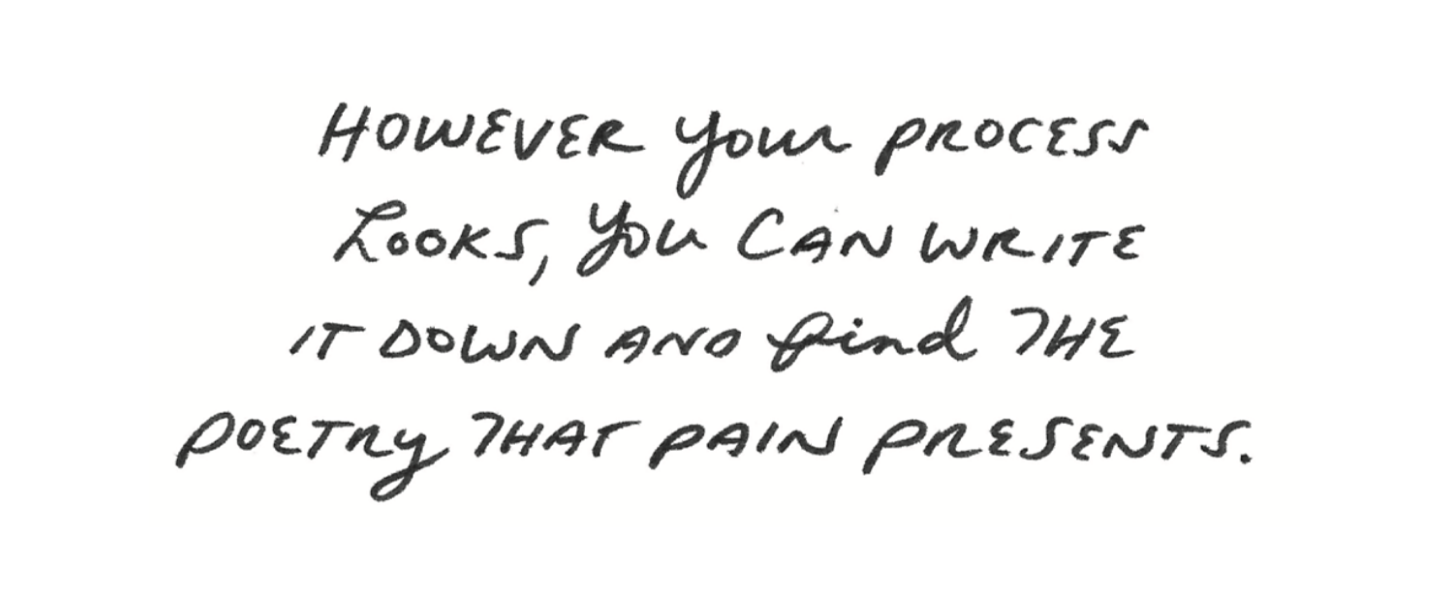
Our traumas create our fears, and our responses to these fears can be as poetic and beautiful as we make them. Let your pain be a source of inspiration, turn this heavy load into poetry, own it, use it, and take as much from it now as it has taken from you in the past.
Close your eyes and meditate on the hidden ache you carry. I like to start with my childhood because that’s what makes sense for me, but you can start anywhere along your timeline. Do you see any images attached to your discomfort? Can you try and put words to your grief and your loss? Who hurt you? What was their childhood like? Why did they do what they did? Make use of the pain of being alive. See the universality in whatever caused you harm, and focus on the connection to others who have survived similar experiences. When I sit with my wounds, I find my resilience, and that makes me want to linger there, gather up the lessons left in the aftermath, and use them for my own creation. Writing about my pain enables me to claim it as my own, and this ownership is empowering.
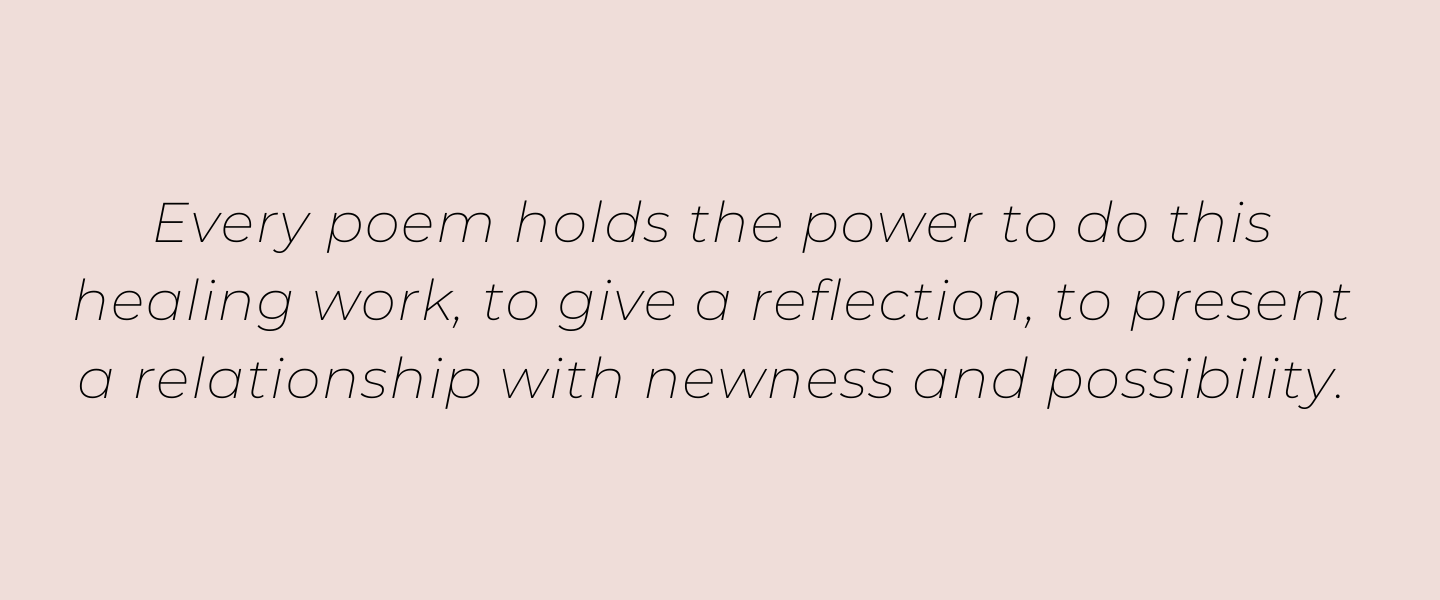
How can you show your reader your personal methods of self-care in a poetic way? Maybe start by writing a list of poems or even song lyrics that have been healing for you in the past. I have poems dog-eared and underlined in every book on my shelf, and I’ll pull them out in a moment of need. They’re my reminders that yes, it is indeed hard to be alive for everyone.
This is an excerpt from Every Day Is A Poem: Find Clarity, Feel Relief, and See Beauty in Every Moment by Jacqueline Suskin.

Jacqueline Suskin has composed over forty thousand poems with her ongoing improvisational writing project, Poem Store. She is the author of six books, including Help in the Dark Season. Her work has been featured in the New York Times, the Atlantic, and Yes! magazine. She lives in Northern California. For more, see jacquelinesuskin.com.
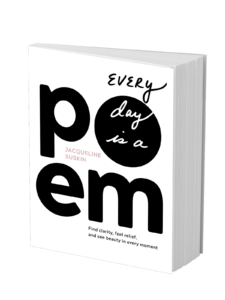
Sounds True | Amazon | Barnes & Noble | Indiebound | Bookshop
Being in Love with the World

In Love with the World
There is no end to love. We may tear ourselves away, or fall off the cliff we thought sacred, or return one day to find the home we dreamt of burning. But when the rain slows to a slant and the pavement turns cold, that place where I keep you and you and all of you—that place opens, like a fist no longer strong enough to stay closed. And the ache returns. Thank God. The sweet and sudden ache that lets me know I am alive. The rain keeps misting my face. What majesty of cells assembles around this luminous presence that moves around as me? How is it I’m still here? Each thing touched, each breath, each glint of light, each pain in my gut is cause for praise. I pray to keep falling in love with everyone I meet, with every child’s eye, with every fallen being getting up. Like a worm cut in two, the heart only grows another heart. When the cut in my mind heals, I grow another mind. Birds migrate and caribou circle the cold top of the world. Perhaps we migrate between love and suffering, making our wounded-joyous cries: alone, then together, alone, then together. Oh praise the soul’s migration. I fall. I get up. I run from you. I look for you. I am again in love with the world.
Journal Questions to Work With
These journal questions have been gathered over the years from my own exploration of journaling and from my work as a teacher. They are starting points, dive spots if you will. Feel free to change them, combine them, undress them, and to voice questions of your own that these might stir, questions that might feel more relevant to what you’re going through. These questions are invitations to better know yourself and to better relate to the currents of life. Each is a chance to personalize all that we have to face.
- Describe your commitment to the ones you love. Under what conditions would you stop loving?
- What kind of care is necessary to create love, maintain love, and protect love?
- Describe the combination of care, freedom, knowledge, and need that makes up the kind of love you value? How is this different from the love you feel able to give?
Looking for more great reads?
Excerpted from Things that Join the Sea and the Sky by Mark Nepo.
 Mark Nepo is a poet and philosopher who has taught in the fields of poetry and spirituality for over 35 years. A New York Times #1 bestselling author, he has published 13 books and recorded eight audio projects. Mark has been interviewed twice by Oprah Winfrey as part of her Soul Series radio show, and was interviewed by Robin Roberts on Good Morning America. As a cancer survivor, Mark devotes his writing and teaching to the journey of inner transformation and the life of relationship. Mark’s work is widely accessible and used in spiritual retreats, healing and medical communities, and more. His work has been translated into 20 languages, and he continues to offer readings, lectures, and retreats.
Mark Nepo is a poet and philosopher who has taught in the fields of poetry and spirituality for over 35 years. A New York Times #1 bestselling author, he has published 13 books and recorded eight audio projects. Mark has been interviewed twice by Oprah Winfrey as part of her Soul Series radio show, and was interviewed by Robin Roberts on Good Morning America. As a cancer survivor, Mark devotes his writing and teaching to the journey of inner transformation and the life of relationship. Mark’s work is widely accessible and used in spiritual retreats, healing and medical communities, and more. His work has been translated into 20 languages, and he continues to offer readings, lectures, and retreats.

